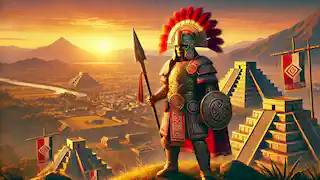Introduction:
In the ancient coastal valleys of northern Peru, long before the rise of the Incan Empire, a mighty civilization known as the Mochica thrived. These skilled artisans, warriors, and rulers left behind a legacy of sophisticated pottery, towering pyramids, and an intricate understanding of the world around them. Central to their existence was their warrior culture, a force that protected their lands from invaders and upheld their society's order. The Mochica warriors, fierce and loyal, were the heart of their empire.
This is the tale of one such warrior, Kanu, whose courage, strength, and wisdom made him a legendary figure in the annals of Mochica history. His journey, filled with trials, betrayals, and triumphs, would ultimately determine the fate of his people.
The Call to War
Kanu had always known his destiny. From a young age, he was groomed to be a warrior, trained in the ways of battle by his father, one of the revered generals of the Mochica army. His father, Tulaq, was a man of few words but immense power, known for leading his warriors to victory against rival tribes. Kanu was expected to follow in his father’s footsteps, and every day of his life was spent preparing for this role.
On the eve of his initiation into the warrior ranks, Kanu stood atop the great Huaca del Sol, the pyramid of the sun, looking out over the fertile lands of his people. The warm breeze carried the scent of the sea, and the sounds of the bustling city below filled his ears. But Kanu's thoughts were elsewhere.
His heart raced with excitement and fear. Tomorrow, he would join the ranks of the Mochica warriors, a title earned through blood and sacrifice. Yet, something in the distance called to him—an unease that had lingered in the air for weeks. It was not just the pressure of his impending initiation. Whispers of an invasion had spread through the city, rumors of a powerful alliance forming among the neighboring tribes who sought to conquer the fertile lands of the Mochica.
Late into the night, as Kanu stood in the shadows of the great pyramid, he heard footsteps approaching. It was his father, Tulaq, tall and stern, with the gaze of a man who had seen many battles.
"My son," Tulaq said in a low, gravelly voice. "Tomorrow, you will be tested. Not just by our traditions, but by the gods themselves. War is coming. The gods have spoken to the priests, and they say that you are destined for greatness. But greatness comes at a cost. You must be prepared to sacrifice everything."
Kanu nodded, though a knot formed in his stomach. He had trained his whole life for this moment, but the reality of war was far different than the drills he had faced. His father’s words were ominous, and the gravity of the situation weighed heavily on him.
As dawn broke the next day, Kanu stood before the council of elders, dressed in the traditional garb of a Mochica warrior. His arms bore the symbols of his ancestors, painted in red and black, and his chest was adorned with a breastplate of gold, signifying his noble lineage.
The elders spoke the ancient words of initiation, blessing Kanu with the strength of the gods. His fellow warriors, men he had trained with for years, stood by his side, ready to join him in battle. But just as the ceremony was concluding, a messenger arrived, breathless and panicked.
"General Tulaq," the messenger gasped. "The tribes to the north—they are marching toward us. Thousands of them. They will be here by nightfall."
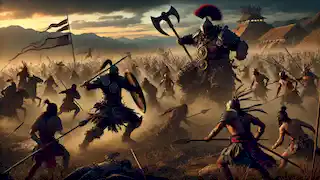
The First Battle
The Mochica army gathered quickly, mobilizing their forces for what would be the first of many battles in a long and brutal war. Kanu, though newly initiated, was placed in a key position beside his father. He was young, but his skill with the spear and shield had already earned him respect among the warriors.
As the sun set over the horizon, the enemy forces appeared on the plains, a dark mass of men and weapons that stretched as far as the eye could see. They were led by the warlord Itzamna, a ruthless leader known for uniting the warring tribes of the north into a single, fearsome army.
Tulaq stood at the front of the Mochica lines, his voice booming over the din of the approaching enemy. "Brothers, sons of the sun! Today, we fight not just for our lands, but for the future of our people! Let the gods guide your hand and strengthen your heart. For the Mochica!"
With a deafening roar, the Mochica warriors charged into battle, their war cries filling the air. Kanu felt the adrenaline surge through his veins as he clashed with the enemy, his spear finding its mark again and again. The sounds of metal on metal, the screams of the wounded, and the heavy thud of bodies hitting the ground created a chaotic symphony of war.
In the midst of the battle, Kanu found himself face to face with Itzamna. The warlord towered over him, his eyes burning with fury. Without hesitation, Kanu lunged at him, their weapons clashing in a deadly dance. For what felt like an eternity, the two fought, neither giving an inch.
Just as Kanu felt his strength beginning to wane, he spotted an opening in Itzamna's defenses. With one swift motion, he drove his spear into the warlord’s side. Itzamna let out a guttural roar of pain but did not fall. Instead, he swung his massive axe at Kanu, knocking him to the ground.
As darkness began to close in around him, Kanu heard his father’s voice, shouting commands to the warriors. The battle raged on, but Kanu's world went black.
A New Path
Kanu awoke days later in the temple of the sun, his wounds bandaged, and his body weak. The battle had been won, but at a great cost. Many of the Mochica warriors had fallen, including Kanu’s father, Tulaq. The news hit him like a blow to the chest.
Tulaq had been a pillar of strength for Kanu, his guiding light in the dark world of war. Without him, Kanu felt lost, unsure of how to lead his people in the battles to come. But as he lay in the temple, recovering from his wounds, the priests came to him with a message.
"The gods have chosen you, Kanu," one of the priests said. "Your father’s spirit watches over you now, and you must carry his mantle. The war is not over, and our people need a leader."
Kanu felt the weight of their words, but he also felt the fire of determination growing within him. His father had prepared him for this moment, and though the path ahead was uncertain, he knew he could not falter.
Over the next few weeks, Kanu took on his father’s role as general, leading the Mochica warriors in a series of skirmishes against the northern tribes. His strategy was different from his father’s, relying more on guerrilla tactics and ambushes rather than open-field battles. His methods earned him both praise and criticism from the council of elders, but they could not deny his effectiveness.
With each victory, Kanu’s reputation grew, and the people began to see him not just as Tulaq’s son, but as a leader in his own right. But as the war dragged on, Kanu found himself facing new challenges—both external and internal.
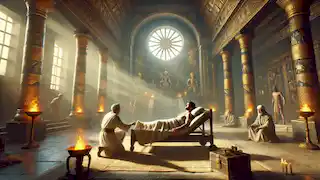
Betrayal from Within
As the months passed, the war began to take its toll on the Mochica people. Resources were stretched thin, and morale was waning. The constant threat of invasion kept the people in a state of fear, and cracks began to form within the once-united council of elders.
One of the elders, a man named Quispe, had grown increasingly vocal in his opposition to Kanu’s leadership. Quispe was an ambitious man, eager to seize power for himself. He believed that the only way to end the war was to negotiate with the northern tribes, to offer them land and wealth in exchange for peace.
Kanu, however, refused to consider such a plan. He knew that the northern tribes could not be trusted, and that any show of weakness would only invite further attacks. But Quispe’s influence was growing, and soon he had gathered a group of followers who shared his views.
One night, as Kanu and his warriors prepared for another battle, Quispe made his move. He and his followers attempted to overthrow Kanu, staging a coup within the council. They planned to offer Kanu’s head to the northern tribes as a peace offering, believing that his death would end the conflict.
But Kanu was not so easily defeated. With the help of his loyal warriors, he fought off the traitors and confronted Quispe in the council chamber. The two men faced each other, their eyes locked in a deadly stare.
"You would betray your own people for power?" Kanu spat, his voice filled with anger.
Quispe sneered. "I do what must be done to save our people. You are leading us to ruin, Kanu. This war will destroy us all."
"The only thing that will destroy us is cowardice," Kanu replied, raising his spear. "And I will not allow you to sow fear and division among our people."
In a swift and decisive blow, Kanu ended Quispe’s life, ensuring that the traitor’s plans would never come to fruition. But the
damage had already been done. The coup had shaken the trust of the people, and Kanu knew that the road ahead would be even more difficult.
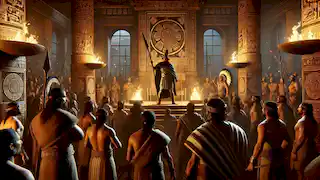
The Final Stand
The northern tribes, emboldened by the rumors of division within the Mochica ranks, launched one final assault on the Mochica capital. Itzamna, though wounded from his earlier battle with Kanu, led the charge, determined to crush the Mochica once and for all.
Kanu, now fully recovered and battle-hardened, rallied his warriors for what would be their last stand. The enemy forces outnumbered them, but Kanu’s warriors were driven by a fierce loyalty to their leader and a burning desire to protect their homeland.
The battle was long and brutal, with both sides suffering heavy losses. Kanu fought with the strength of ten men, his spear cutting through the enemy ranks like a scythe. But despite their best efforts, the Mochica warriors were slowly being pushed back.
In the heat of the battle, Kanu once again found himself face to face with Itzamna. The two leaders, both scarred from their previous encounters, locked eyes, knowing that this would be their final confrontation.
With a roar, Itzamna charged at Kanu, swinging his massive axe. Kanu dodged the blow and countered with a strike of his own, driving his spear into Itzamna’s chest. But Itzamna, fueled by rage and hatred, did not fall. He grabbed Kanu by the throat, lifting him off the ground.
For a moment, it seemed as though Kanu’s fate was sealed. But with one last burst of strength, Kanu drove his knife into Itzamna’s neck, severing the warlord’s artery. Itzamna released his grip, and Kanu fell to the ground, gasping for air as the warlord’s lifeless body crumpled beside him.
The death of their leader sent shockwaves through the northern tribes, and soon the remaining warriors began to retreat. The battle was over, and the Mochica had emerged victorious.
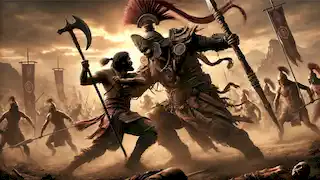
Epilogue: The Legacy of Kanu
In the years that followed, Kanu’s legend grew. He became known not just as a great warrior, but as a wise and just leader who had saved his people from certain destruction. Under his rule, the Mochica civilization flourished, their lands expanding, and their culture thriving.
Kanu’s story was passed down through generations, a tale of courage, sacrifice, and the unbreakable bond between a leader and his people. Though the Mochica civilization would eventually fade into history, the legend of Kanu and his warriors would live on, a testament to the strength and resilience of the human spirit.
